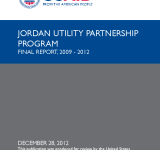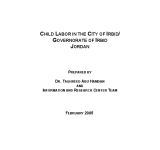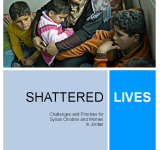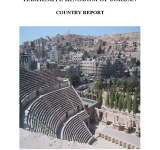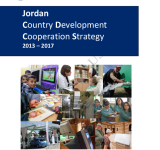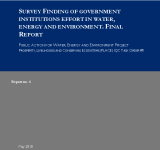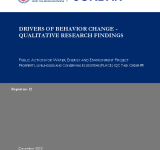This publication aims to summarize and assess the results of the United States Energy Association (USEA)’s Jordan Energy Partnership Project (JUPP);; funded by the USAID. The JUPP is part of the USEA/USAID Energy Utility Partnership Program (EUPP);; which assists developing countries with increasing environmentally sustainable energy production and use and improving the operational efficiency and increased financial viability of their utilities and related institutions. The JUPP focuses on improving the technical and operational efficiency of Jordan’s electric utilities and electric grid. Defining energy insecurity as one of the most significant problems in Jordan;; the report summarizes the program’s activities and assesses their results and impacts. It looks at multiple aspects including the utility participant training and female participation. The results of the publication are increasing system efficiency;; developing customer energy efficiency programs;; increasing corporate efficiency;; supporting capacity building;; reducing electricity losses and power outages;; improving transmission dispatch center operations;; enhancing worker productivity through safety and interconnecting renewable energy and distributed generation. The report concludes with key lessons learned from the projects.
والبيئة
This research study aims to investigate child labor in Irbid to provide a deep understanding of and knowledge about the socio-economic and cultural context of working children in Irbid. It also aims to propose intervention programs that maximize the effectiveness of the Family and Childhood Protection Society (FCPS);; an NGO in Irbid that works on issues related to children. Various study results have shown that children often work in dangerous and hazardous conditions where they are exposed to physical and psychological abuse;; in addition to exploitation in terms of minimal pay and long working hours. Both qualitative and quantitative methodologies were used to conduct the research presented in this report. In-depth interviews and questionnaires were used to collect data from all organizations working on child-related issues and from working children and their family members.
In 2006;; the Sultanate of Oman undertook a project that aimed to support the implementation of the country’s vision towards conservation of biological diversity in the Sultanate of Oman. This report serves as an “evaluation and assessment of capacity building in the field of traditional knowledge related to biodiversity.” The report aims to describe the state of traditional knowledge on biodiversity in Oman;; assess capacity-building requirements in relation to traditional knowledge;; and provide a set of recommendations with a strategy for the protection and maintenance of traditional knowledge on biodiversity conservation. Various topics related to biodiversity are covered;; including irrigation;; tree cultivation;; crop improvement;; livestock management;; and soil and water conservation. The methodology used depends on three sources of information;; including a review of secondary data;; in-depth interviews;; and a participatory workshop.
With an executive summary on the Syrian refugees situation in Jordan;; the report combines the conclusions of detailed assessments in various areas including as child protection and gender-based violence;; education;; water sanitation and hygiene;; and nutrition and health. It provides a holistic picture of the situation faced by Syrian children and women in Jordan to draw out recommendations for necessary plans of action. Some key findings of the report include growing challenges for water;; sanitation and hygiene situation in Za’atari camp;; several threats to the nutritional status and health of Syrian girls;; boys and women and increasing violence against adolescents. Bringing together the voices of children and women at the camps;; the report examines the situations of Syrian refugees in host communities and refugee camps and finds key recommendations based on them.
The report was published from the World Health Organization/ United Nations Children’s Fund (WHO/UNICEF)’s pilot project to test a method for the rapid assessment of the quality of drinking-water in six countries;; including Jordan;; China;; Ethiopia;; Nicaragua;; Nigeria and Tajikistan. This assessment report aims to develop a tool that would support WHO/UNICEF’s joint program in strengthening the monitoring efforts of the global access to safe drinking water. The analysis of the report is based on the water samples and statistical data that were collected from 1600 drinking water supply sites in 67 clusters. The report finds that drinking water quality is generally high in the distribution network of Jordan and national standards for bacteria complies with the WHO guideline values. It also identifies the sanitary risk factors for Jordanian water supplies including the presence of sewer lines;; old pipes and failure to properly maintain household storage tanks.
Defining the goal as improved prosperity;; accountability and equality for a stable;; democratic Jordan;; the strategy report highlights a long-standing partnership between Jordan and the United States. Amidst a number of challenges;; Jordan continues to play a strategic ally in the region and therefore;; the report stresses the importance of assisting Jordan in carrying out its stated commitment to broad-based political and economic reforms. The three development objectives are 1. Broad-based;; inclusive economic development accelerated;; 2. Democratic accountability strengthened;; and 3. Essential services to the public improved;; with a special development objective of gender equality and female empowerment enhanced. According to the report;; the key theme of the strategy is complementing support for Jordanian-led structural reform with grassroots activities of more visible and more directly “felt” people-level impact. The development objectives find specific areas of focus that need the USAID investments and support.
The report presents the findings of the government institutions efforts survey;; which is designed for the purpose of reviewing the government agencies’ current and past communication activities in water;; energy and environment. The specific objective of this survey is to review the Donor Position Paper on Outreach targeted sample of 36 staff from 22 government institutions from Aqaba and Karak. As part of the Public Action for Water;; Energy and Environment Project (PAP);; a public education and behavior change communication program developed to support USAID’s technical and policy investments in the Jordanian water and energy sectors;; this report finds that many government institutions have more than one role;; overseeing solid waste management;; industrial water and reuse and environmental laws. The report also finds that the communications programs are scattered and credibility and trust between service agencies and their clients is a concern. The interview analysis suggests that the Public Action Project needs to focus on two or three specific areas;; and the report recommends all capacity building activities to be focused on one goal of developing;; implementing and measuring national communication strategies and action plans.
The report aims to understand the outlook of Jordanians;; the key determinants of behavioral change in search for “drivers” that can be used in programs promoting conservation of water or energy and reduction of solid waste. This research was conducted as part of the Public Action for Water;; Energy and Environment Project (PAP);; which aims to encourage water and energy conservation and to support behavior change towards more conservation and efficient practices both at the household level and in the commercial;; industrial and civil society arenas using social marketing behavioral methods. It is based on the qualitative research that focuses on identifying people’s motivations;; needs and desires to help formulating social marketing programs and developing adaptive capacity in individuals and groups. Some of the key questions of the qualitative research include “What are the current coping behaviors and attitudes (psychological;; social;; etc …) of the Jordanian public (disaggregated by gender;; age;; geography and income) in the face of limited water availability and high prices for energy?;; What anticipated consequences may the Government face if stricter scenarios were imposed on water and energy? The report recommends the Ministry of Education to cooperate and introduce regular classes that focus on showing youth the direct impact of water;; energy and environment on their lives and raise awareness and consciousness of children regarding their role in the environment and influence it in a positive way.
